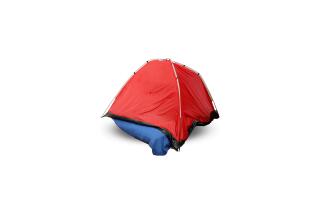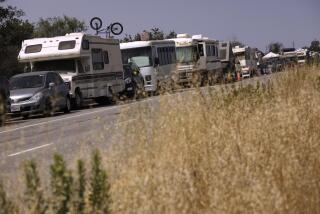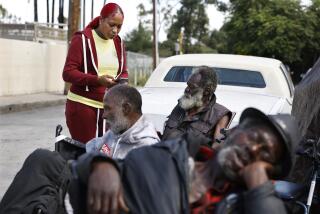‘She hadn’t showered in nine days.’ L.A. makes it hard to be homeless, avoid coronavirus
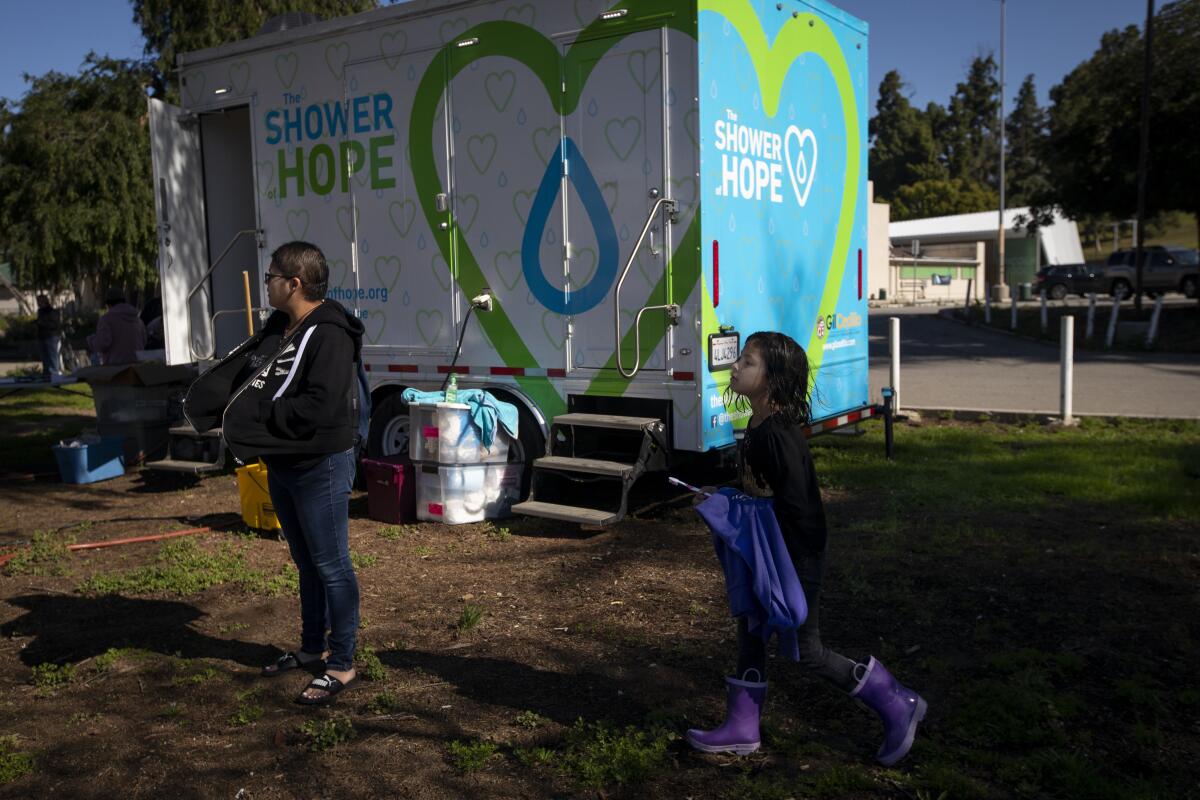
Harry Sanchez knows how important it is to wash your hands these days, but he’s never certain when he’ll have access to soap and water.
Tinkering with a hand-held radio while his belongings sat in a bag leaning against a mountain bike in Lincoln Park last week, the 58-year-old maintenance man was as concerned as anyone about catching the novel coronavirus. Homeless since 2014, Sanchez says he usually tries to keep clean by visiting businesses with public restrooms or cobbling together enough change to buy hand wipes.
But with more and more businesses closing as the number of coronavirus cases in L.A. County balloons, Sanchez says his already short list of options to maintain basic hygiene has dwindled toward none.
“Everything is closed that people would normally use ... and there’s a lot of chances to catch it when you’re dirty and outside,” he said.
As dangerous as the novel coronavirus has already proved to be, many fear that an outbreak among L.A. County’s vulnerable homeless population could prove especially deadly, putting even more stress on overwhelmed hospitals. With hygiene crucial to preventing that outcome, people in Sanchez’s situation are becoming even more reliant on a network of mobile showers and public washing stations staffed, in part, by volunteers willing to risk their own health to help others.
“What we’ve told the staff is this thing is a beast, it spreads like nothing else … everyone has been advised if they want to take a leave, it’s nothing personal,” said Mel Tillekeratne, the founder of Shower of Hope, a network of trailers with washing stations that operates across L.A. County. “I really thought we would not be operating, I thought our guys would break out, but they were like, no, we need it now more than ever.”
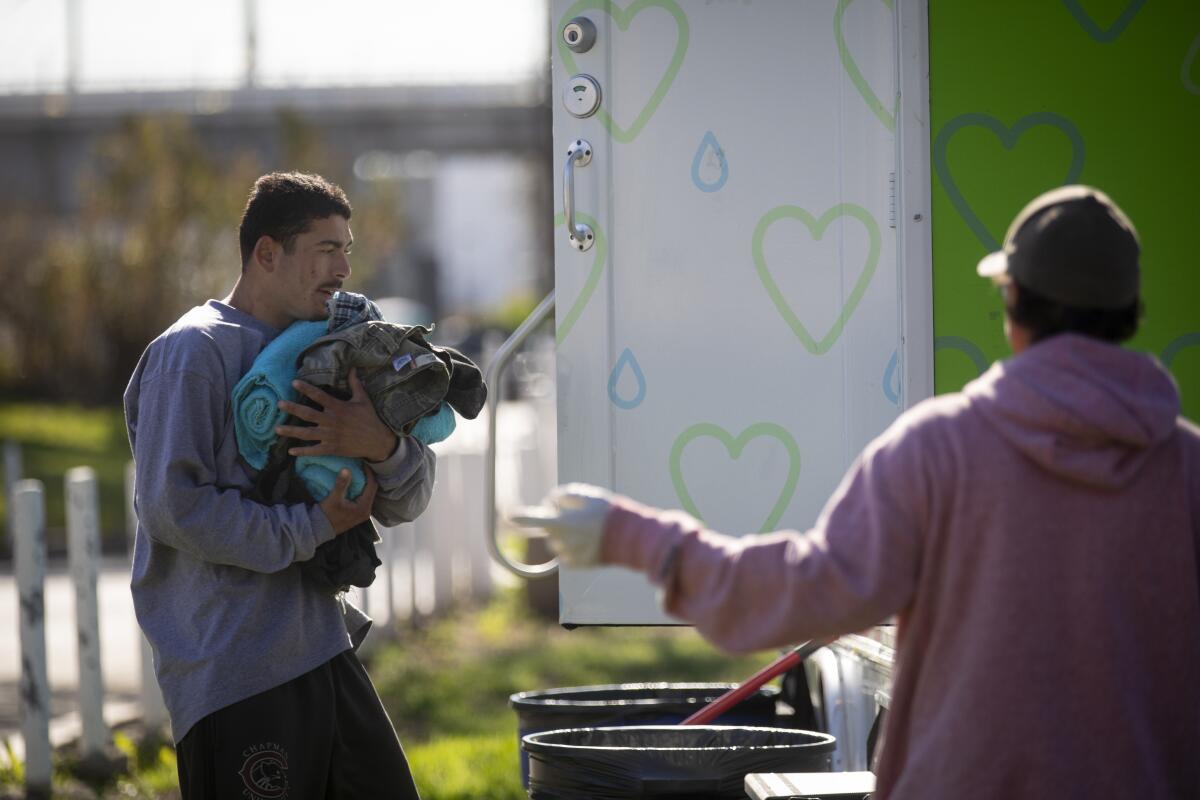
There have been no confirmed cases of coronavirus infection among L.A.’s homeless population. But with at least six Los Angeles police officers testing positive in the LAPD’s Central Division — which patrols skid row and downtown L.A. among other areas — and the true extent of the virus’ spread unknown because of the lack of testing, some activists worry that it’s only a matter of time. Already, several homeless people with flu-like symptoms are in isolation and awaiting test results.
A new study found that as many as 2,600 homeless people in the L.A. area could require hospitalization if the virus were to spread among those living in encampments.
City and county officials have announced expansive measures to help get homeless people off the street as part of a larger effort to combat the virus. The city is opening shelters in recreation centers across Los Angeles, placing a total of 360 hand-washing stations in various neighborhoods and rolling out a dozen mobile shower trucks, according to a March 23rd court filing connected to a lawsuit about homelessness in L.A. County.
Advocates, however, have said some of the hand-washing stations have already run out of water or become too dirty to use. With the city still rolling out its crisis response, long-standing resources such as Shower of Hope and the Skid Row Community Refresh Spot are likely to prove even more essential in stemming the spread of the coronavirus, advocates say.
On Thursday, several homeless people hurried out of an encampment in Lincoln Park in Lincoln Heights, and a row of nearby cars-turned-homes on Valley Boulevard, toward a Shower of Hope trailer. An hour later, the line to use the Refresh Spot spilled out onto Crocker Street, partially blocking traffic.
“I saw it this morning and said, ‘Oh, thank God, they’re back,’” said 25-year-old Rita Rios, who seized the opportunity to wash up at the Shower of Hope trailer with her 8-year-old daughter, Shailene. The pair live in a car nearby and said it’s been especially difficult to stay clean with the rainy weather in recent weeks.
Shower of Hope’s trailers operate at least once per week in Highland Park, Lincoln Heights, Hollywood, Koreatown, MacArthur Park, El Monte and Pasadena, Tillekeratne said. Although it started as a volunteer effort, the nonprofit group began receiving funding and partnering with the Los Angeles Homeless Services Authority and the office of L.A. City Councilman Gil Cedillo in 2018.
Tillekeratne said social distancing measures and the public’s reaction to the coronavirus have had an outsize effect on the homeless population.
In addition to the closing of businesses that might offer them a bathroom or at least brief shelter, the hoarding of supplies from grocery and big-box stores has also affected homeless people, who can’t afford to stock up and lack a safe space to store provisions.
A woman who usually visits the group’s Highland Park location left a desperate message on Tillekeratne’s Facebook page this month, he said.
“She went on one of our pages and put this heartbreaking post … saying she hadn’t showered in nine days, a gas station was barring her from using bathrooms,” he said. “She couldn’t buy toilet paper anywhere.”
Pete White, executive director of the skid row-based Los Angeles Community Action Network, said that though he applauds Angelenos for largely abiding by Mayor Eric Garcetti’s “Safer at Home” order to reduce the spread of the coronavirus and COVID-19 cases, the shutdown has had unintended consequences.
“As a result of self-isolation and stay-at-home orders, what we’re seeing is a drop in charitable food giving.… Those church programs that would come out and supplement both food stamps and other ways that people were getting food are now no longer there,” he said.
The problem has been made worse by the crowded, cramped and unsanitary conditions on skid row, where social distancing and basic hygiene are nearly impossible. Four of the six hand-washing stations the city placed in skid row also had been drained of water and not refilled, White said.
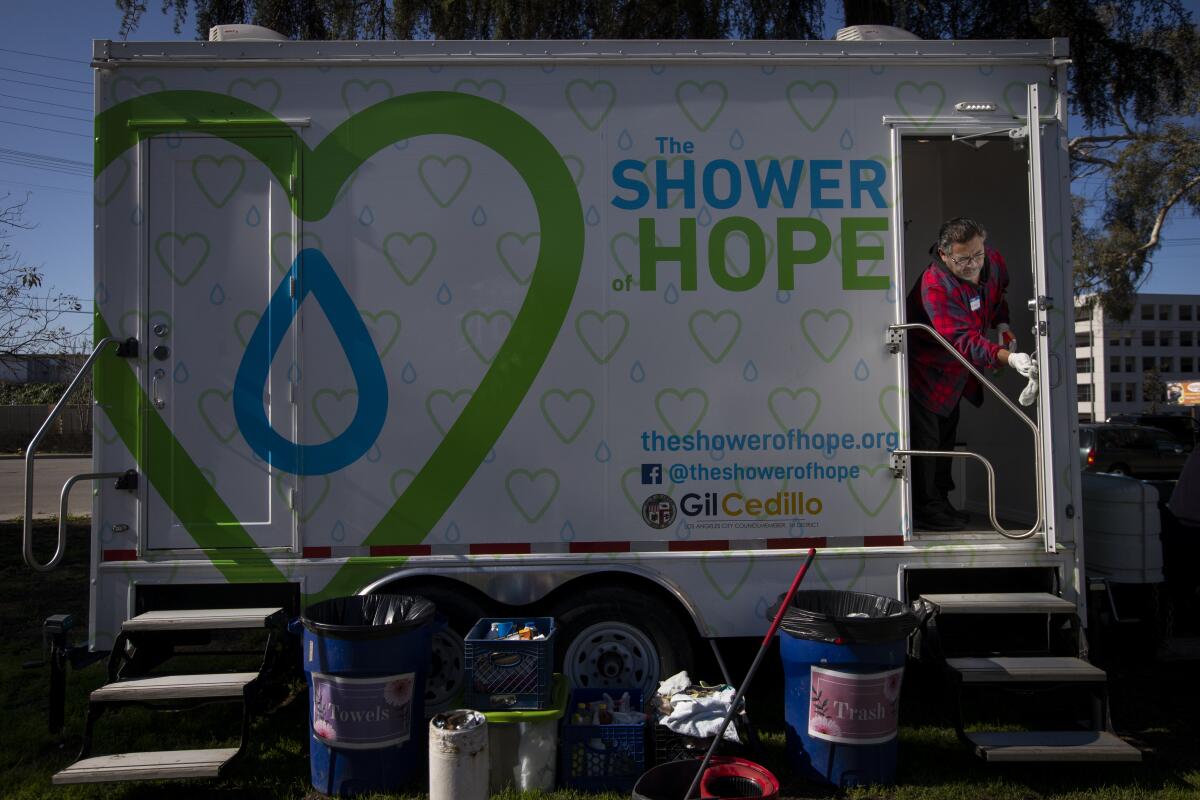
Alex Comisar, a spokesman for Garcetti, said sanitation workers are cleaning the hand-washing stations daily and informing the city when the soap and water needs to be replenished. The city then relays that information to United Site Services, the vendor in charge of refilling the stations, he said.
Comisar did not respond to questions about how many washing stations have actually been deployed or the city’s plans to roll out mobile shower trailers.
White said he’s thankful for Shower of Hope and other volunteer-driven groups that have embraced a “DIY spirit” to plug some of the gaps in the city’s response. He and other members of a “skeleton crew” who are still going to L.A. CAN’s skid row office have begun building 20-gallon containers to hold soap and water in the downtown area.
But that work comes with a cost, White said.
“I haven’t been able to see my mother, I haven’t been able to see my son, because I’m in the thick of it,” said White, who doesn’t want to risk infecting them.
In Lincoln Heights, 58-year-old Daniel Monreal put on a fresh pair of gloves before wiping down a stall inside a Shower of Hope trailer. He decided to volunteer for the first time on Thursday while on furlough from his job as a plumber at a Pasadena school.
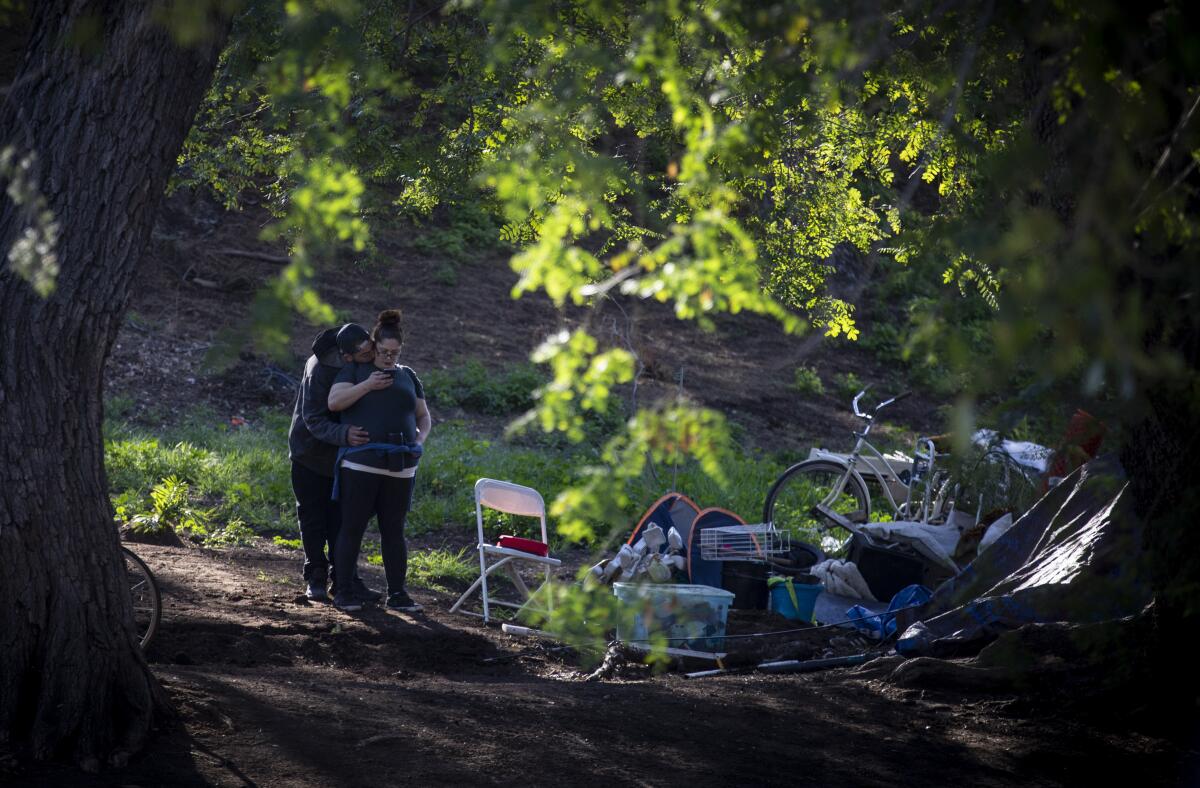
Monreal said he was confident that he’d taken proper measures to protect himself from exposure, and thought it was important to help during the pandemic.
“Maybe one day, God forbid, we might be in the same position. Where we’ll be homeless because we couldn’t pay our rent because we don’t have a job because of this whole thing,” he said. “How would we feel if there’s nobody to help us?”
Times staff writers Benjamin Oreskes and Emily Alpert Reyes contributed to this report.
More to Read
Sign up for Essential California
The most important California stories and recommendations in your inbox every morning.
You may occasionally receive promotional content from the Los Angeles Times.
